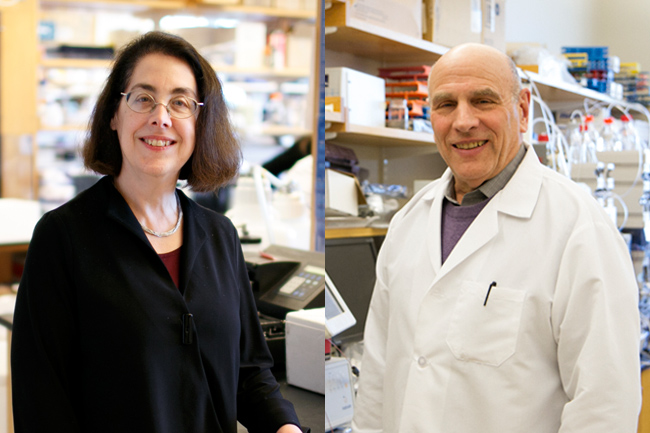News All News
April 6th, 2017
Missing ingredients for cancer immunotherapy may be found in the gut
Two Harvard scientists to receive $4.5M support from Quark Venture for research on microbiome-derived molecules to improve immune-oncology

The two principal investigators, Dr. Sharpe and Dr. Kasper, have been trailblazers in their fields of cancer immunology and microbiome science, respectively.
Cambridge, Mass. – April 6, 2017 – A pair of world-leading biomedical scientists at Harvard Medical School (HMS) will receive $4.5 million in new research funding to support their efforts to jointly develop and exploit a unique drug discovery platform.
Combining cutting-edge insights from gut microbiology, immunology, and oncology, Arlene Sharpe, MD, PhD, and Dennis Kasper, MD, will deploy a new “immune-oncology-microbiome” (IOME) platform to identify new strategies and molecular candidates to improve the outcomes of cancer immunotherapy.
Quark Venture, a Vancouver-based venture capital investment firm that specializes in supporting innovative biotechnology platforms and projects, is providing this significant early-stage support under a sponsored research agreement with Harvard University’s Office of Technology Development (OTD).
“It has become clear through clinical experience with checkpoint inhibitors that the composition of the microbiome has a strong effect on patients’ response to the drugs,” said Michal Preminger, Executive Director of Harvard OTD’s HMS branch. “These two pioneering Harvard scientists are now coming together to tackle the riddle of what, in the microbiome, is causing this differential response.”
The IOME platform is aimed at identifying new bacterial strains, molecules, or drug targets that address the problem of resistance to immunotherapy and create new treatment strategies in immune-oncology.
“We are pleased that Quark Venture shares our vision regarding the potential impact of the IOME platform and is supporting this important program at Harvard Medical School,” said Isaac T. Kohlberg, Harvard’s Chief Technology Development Officer and Senior Associate Provost.
Under the terms of the agreement, Quark Venture will have the option to negotiate a license to intellectual property that arises from the project, which would enable a startup company to develop it further toward commercial applications that ultimately benefit patients.
“We are privileged to be collaborating with Dr. Sharpe, Dr. Kasper and the Harvard Medical School on the groundbreaking IOME platform. This early-stage support will provide the necessary resources to validate and advance the potential breakthrough cancer research of these two distinguished scientists,” said Karimah Es Sabar, Chief Executive Officer of Quark Venture. “We look forward to ongoing collaboration with Harvard Medical School to identify and support additional innovative technologies that will lead to breakthrough therapies and startup companies.”
The two principal investigators, Dr. Sharpe and Dr. Kasper, have been trailblazers in their fields of cancer immunology and microbiome science, respectively.
Sharpe was among the first scientists to discover and elucidate checkpoint biology, a mechanism by which many tumor cells evade the immune system by inhibiting T cell responses to tumors. Her findings, especially her contributions to understanding the CTLA-4 and PD-1/PD-L1 pathways, led to the development of checkpoint inhibitors, several versions of which are now on the market for cancer immunotherapy.
Kasper has been a pioneer in recognizing the crucial role of the microbiome — the blend of microbial communities that live in and on the human body — in maintaining health and preventing disease. His research strategy has successfully led to the isolation of individual species of bacteria in animal models and of bacterial products that have shown efficacy in models of disease. Through such studies, his work has explored the molecular interactions between these gut microbes and the cells of the immune system, shedding light on the mechanisms by which each species enhances or blocks immune system activation.
“The complementary expertise of each of our labs fits very well what we think needs to be done in this area of research,” said Kasper, the William Ellery Channing Professor of Medicine and Professor of Microbiology and Immunobiology at HMS.
“The first cancer immunotherapy was one directed against CTLA-4, and only about 20 percent of the patients responded. Now PD-1 pathway immunotherapy is approved for seven different types of tumors, but only about a third of those patients respond to treatment,” said Sharpe, the George Fabyan Professor of Comparative Pathology at HMS. “For some patients, immunotherapy seems to provide a durable response that can last for a decade, so there’s great interest now in trying to see how we can increase that benefit to a greater number of patients by combining checkpoint blockade therapy with something else. In this project we’ll aim to identify specific components of the microbiome that can work together with checkpoint blockade.”
Drawing on the expertise, advanced research tools, and skills of their two labs, Sharpe and Kasper hope to delve further into the mechanisms of interaction between the microbiome and the immune system to create a library of new knowledge and define possible therapeutic strategies.
“This is a relatively new area of investigation, but the impact of the microbiome on the immune system is dramatic,” said Sharpe. “We’re really just beginning to appreciate the extent to which it controls immune responses.”
“This program has a strong potential for translational components,” added Kasper. “We’re excited to have this opportunity to make a substantial contribution to the field and, we hope, to patient care.”
Press Contact: Kirsten Mabry | (617) 495-4157
